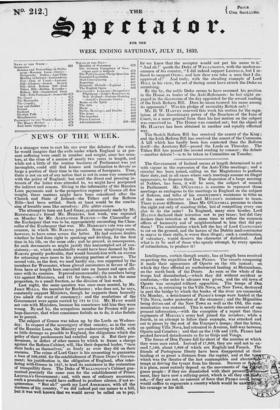, NEWS OF THE WEEK IF a stranger were to
cast his eye over the debates of the week, lie would imagine that the evils under which England is at pre- sent suffering were small in number and weight, since her sena- tors, at the close of a session of nearly two years in length, and while not a little of the routine business of Parliament was yet incomplete, could still find leisure and inclination to devote so large a portion of their time to the concerns of foreigners. True, there is not an act of any nation that is not in some way connected with the policy of England; but until the direct and pressing in- terests of the latter were attended to, we might have postponed the indirect and remote. Giving to the informality of the Russian Loan payments and to the prospective regency of Greece all due weight, these matters might have been considered after the Church and State of Ireland—the Tithes and the Reform \ Bills—had been settled. Such at least would be the conclu- sion of humble men like ourselves : Df.g aliter visum.
The attempt to turn out Lord GREY, so strenuously made by Mr. RoruseniLD s friend Mr. HEnazis, last week, was repeated on Monday by Mr. ALEXANDER BARING — the Chancellor of the Exchequer that was to be, appropriately succeeding the Chan- cellor of the Exchequer that was. Mr. HERRIES'S vote was one of censure, in which Mr. BARING joined. Some misgivings seem, however, to have come across the latter. He had serious doubts whether he had done right in speaking and dividing, for the first time in his life, on the same side; and he prayed, in consequence, for such documents as might justify this unexampled act of con- sistency,—or, which undoubtedly would have been deemed by Mr. BARING greatly preferable, that would furnish him with an excuse for returning once more to his pleasing pastime of seesaw. The second vote, as the first, we need hardly say, was supported by the members for Worcester, whose gloved encounters in favour of Re- form have at length been converted into an honest and open alli- ance with its enemies. It proved unsuccessful; the numbers being 155 against Ministers, and 191 for them,—which is in the same proportion, to a small fraction, as the division of last week. Last night, the same question was once more mooted, by Mr. JOHN MILLS, the member for Rochester ; who does not, he says, constantly support Ministers, though he supports them honestly (we admit the want of constancy) : and the resolutions of the Government were again carried by 191 to 112. Mr. HUNT would not vote with Ministers, because his conscience told him they were wrong. By and by, the scrupulous member for Preston will per- haps discover, that what conscience forbids us to do, it also forbids us to permit. The subject of Greece was taken up by the Lords on Wednes- day: In respect of the sovereignty of that country, as in the case of the Russian Loan, the Ministry are endeavouring to fulfil, with as little damage as possible to England, the obligations which the policy of their predecessors had entailed upon it. But their pre- decessors, in defect of other means by which to frame a charge against the Reform Cabinet, will, like their departed leader, "turn their backs on themselves," as freely as ever they did on their
enemies. The crime of Lord GREY is his consenting to guarantee a loan of 800,0001. for the establishment of Prince OTHO s Govern- rnent; his justification is, the obligation of England, after inter- fering with Greece in 1827, to lend its assistance in the restoration of tranquillity there. The Duke of WELLINGTON'S Cabinet gua- ranteed precisely the same sum for the establishment of Prince LEOPOLD'S Government; and, with men of ordinary assurance, such a precedent would have sufficed to produce silence, if not ac- quiescence. "But oh!" quoth my Lord ABERDEEN, with all the wariness of his country, "we did indeed put our names to a bill, but it was well known that we would never be called on to pay,
for we knew that the acceptor would not put his name to it." "And ah !" quoth the Duke of 'WELLINGTON, with the modest as- surance of his country, "I did indeed support LEOPOLD, but I re- fused to- support OTHO ; and how dare you take a man that I dis- approved of?" And truly, with the standing example of Lord HILL in his view, the act of daring must have struck the Duke as surprising.
By the by, the noble. Duke seems to have resumed his position. in the House as leader of the Anti-Reformers : he last night en- gaged in the discussion of the day appointed for the second reading Of the Irish Reform Bill. Does he mean to enrol his name among its opponents? Was his pledge of neutrality British only?
Mr. D. W. HARVEY renewed this week his motion for the regu- lation of the discretionary power of the Benchers of the Inns of Court, in a more general form than his last motion on the subject was conceived in: The House Was counted out; but the object of Mr. HARVEY has been obtained in another and equally effectual' way. The Scotch Reform Bill has received the assent of the King; and the Irish Reform Bill has received the assent of the Commons. A bill which has hardly been less contested than the Reform itself—the Anatomy Bill—passed the Lords on Thursday. The Tithes Bill has passed the second reading by consent ; the debate —another debate !—is to be taken in Committee on Tuesday.



























